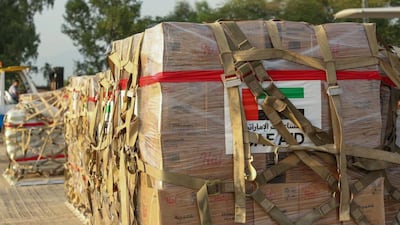Relentless monsoon rains in Pakistan have left a third of the country under water, its climate minister said.
Flash floods have washed away roads, crops, infrastructure and bridges, killing at least 1,000 people in recent weeks.
Aid efforts were stepped up across Pakistan on Tuesday to help more than 33 million people affected, which is more than 15 per cent of the country's 220 million population.
Pakistan's Climate Change Minister Sherry Rehman said “literally a third” of the country was under water.
“To see the devastation on the ground is really mind-boggling,” she told AFP, comparing scenes to a dystopian film.
“When we send in water pumps, they say 'Where do we pump the water?' It's all one big ocean, there's no dry land to pump the water out.”
Damage could cost more than $10 billion if early estimates are correct, the country's planning minister said on Monday.
Ahsan Iqbal called the situation a “climate-induced humanitarian disaster of epic proportions”.
“I think it is going to be huge. So far, (a) very early, preliminary estimate is that it is big, it is higher than $10bn,” he told Reuters.
“So far we have lost 1,000 human lives. There is damage to almost nearly one million houses,” Mr Iqbal said at his office.
“People have actually lost their complete livelihood.”
UAE sends humanitarian aid to Pakistan — in pictures
He said the floods were worse than those that hit Pakistan in 2010, for which the UN issued its largest disaster appeal yet.
The minister said it might take five years to rebuild and rehabilitate the nation, while in the near term it will be confronted with acute food shortages.
To mitigate those, Finance Minister Miftah Ismail said Pakistan could consider importing vegetables from India.
The two neighbouring countries have not had any trade for a long time.
“We can consider importing vegetables from India,” Mr Ismail told local Geo News TV, adding other possible sources of food imports included Turkey and Iran.
Food prices have increased because of flooded crops and impassable roads.
India Prime Minister Narendra Modi said he was saddened by the devastation caused by the floods.
Social media users posted videos showing stranded people and whole families washed away by floodwater. Reuters was unable to verify the footage independently.
Southern, south-western and northern Pakistan have been the hardest hit by the floods, which have swept large swathes of farmland and stored crops, also isolating the regions from rest of the country for the last several days.
Tens of thousands of families have left their homes for safer places, moved in with their relatives, or to state-run camps, while others have been spending nights in the open, waiting for help including tents, food and medicine.
'The world owes Pakistan'
Pakistan has appealed for international help and some countries have already sent in supplies and rescue teams.
The nation's foreign minister told Reuters on Sunday he hoped financial institutions such as the International Monetary Fund would provide aid, taking the economic cost of the floods into account.
However, Mr Iqbal said any formal requests for financial help would need to wait until the scale of the damage was known, something Pakistan was now evaluating with partners, including the World Bank and the Asian Development Bank.
Mr Iqbal said the world owed Pakistan, which was a victim of climate change caused by the “irresponsible development of the developed world”.
“Our carbon footprint is lowest in the world,” he said. “The international community has a responsibility to help us, upgrade our infrastructure, to make our infrastructure more climate resilient, so that we don't have such losses every three, four, five years,” he said.




